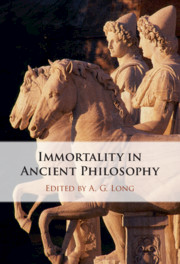Book contents
- Immortality in Ancient Philosophy
- Immortality in Ancient Philosophy
- Copyright page
- Contents
- Contributors
- Introduction
- Chapter 1 The Soul and the Celestial Afterlife in Greek Philosophy before Plato
- Chapter 2 Pythagorean Immortality of the Soul?
- Chapter 3 The Philosopher’s Reward: Contemplation and Immortality in Plato’s Dialogues
- Chapter 4 Pre-Existence, Life after Death, and Atemporal Beings in Plato’s Phaedo
- Chapter 5 The Immortal and the Imperishable in Aristotle, Early Stoicism, and Epicureanism
- Chapter 6 Socrates and the Symmetry Argument
- Chapter 7 Immortality in Philo of Alexandria
- Chapter 8 Plotinus on Immortality and the Problem of Personal Identity
- Chapter 9 Truth and Immortality in Augustine’s Soliloquies and De Immortalitate Animae
- Index of Passages
- Index of Names and Subjects
- References
Chapter 5 - The Immortal and the Imperishable in Aristotle, Early Stoicism, and Epicureanism
Published online by Cambridge University Press: 20 May 2021
- Immortality in Ancient Philosophy
- Immortality in Ancient Philosophy
- Copyright page
- Contents
- Contributors
- Introduction
- Chapter 1 The Soul and the Celestial Afterlife in Greek Philosophy before Plato
- Chapter 2 Pythagorean Immortality of the Soul?
- Chapter 3 The Philosopher’s Reward: Contemplation and Immortality in Plato’s Dialogues
- Chapter 4 Pre-Existence, Life after Death, and Atemporal Beings in Plato’s Phaedo
- Chapter 5 The Immortal and the Imperishable in Aristotle, Early Stoicism, and Epicureanism
- Chapter 6 Socrates and the Symmetry Argument
- Chapter 7 Immortality in Philo of Alexandria
- Chapter 8 Plotinus on Immortality and the Problem of Personal Identity
- Chapter 9 Truth and Immortality in Augustine’s Soliloquies and De Immortalitate Animae
- Index of Passages
- Index of Names and Subjects
- References
Summary
This chapter is about the achievement of immortality in contexts where an everlasting future for the subject is not envisaged. I start with Aristotle’s advice in the Nicomachean Ethics to ‘act as an immortal’ and argue that the talk of immortality does not derive from Aristotle’s own theories about the soul and intellect but rather should be understood with reference to the immediate dialectical context. I then relate Epicurean and Stoic discussions of immortality and ‘imperishability’ to the relevant parts of their theology. The early Epicurean tradition mentions ‘immortal goods’ that can be attained by human beings and are enough to make human beings, in the relevant ethical respect, godlike. Epicureanism contains more than one conception of these ‘goods’, although they should never be identified with either immortality or imperishability. In Stoicism the attribution of mortality and immortality is controlled by strict adherence to a Platonic definition of death (the separation of soul from body) – stricter adherence than we find in the Phaedo itself.
- Type
- Chapter
- Information
- Immortality in Ancient Philosophy , pp. 118 - 142Publisher: Cambridge University PressPrint publication year: 2021

